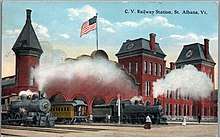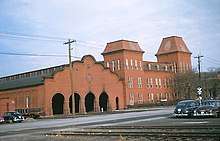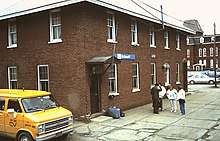St. Albans station (Vermont)
St. Albans station is an Amtrak train station in St. Albans, Vermont, United States. It is the northern terminus of the daily Vermonter service.
St. Albans, VT | ||||||||||||||||||||||||||||||||
|---|---|---|---|---|---|---|---|---|---|---|---|---|---|---|---|---|---|---|---|---|---|---|---|---|---|---|---|---|---|---|---|---|
 The Vermonter at St. Albans in October 2018 | ||||||||||||||||||||||||||||||||
| Location | 40 Federal Street St. Albans, Vermont | |||||||||||||||||||||||||||||||
| Coordinates | 44°48′44″N 73°05′10″W | |||||||||||||||||||||||||||||||
| Line(s) | New England Central Railroad | |||||||||||||||||||||||||||||||
| Platforms | 1 side platform | |||||||||||||||||||||||||||||||
| Tracks | 1 | |||||||||||||||||||||||||||||||
| Connections | ||||||||||||||||||||||||||||||||
| Construction | ||||||||||||||||||||||||||||||||
| Disabled access | Yes | |||||||||||||||||||||||||||||||
| Other information | ||||||||||||||||||||||||||||||||
| Station code | SAB | |||||||||||||||||||||||||||||||
| History | ||||||||||||||||||||||||||||||||
| Opened | January 10, 1851 September 29, 1972 July 19, 1989 | |||||||||||||||||||||||||||||||
| Closed | September 6, 1966 April 6, 1987 | |||||||||||||||||||||||||||||||
| Rebuilt | June 1867 | |||||||||||||||||||||||||||||||
| Traffic | ||||||||||||||||||||||||||||||||
| Passengers (FY 2018) | 3,726[1] | |||||||||||||||||||||||||||||||
| Services | ||||||||||||||||||||||||||||||||
| ||||||||||||||||||||||||||||||||
| ||||||||||||||||||||||||||||||||
Service to St. Albans on the Vermont Central Railroad began in 1851. A new station with a large trainshed and an adjacent office building were completed in 1867 as part of major construction of the railroad's main shops. Service under the Central Vermont Railway (later part of the Grand Trunk Railway and Canadian National Railway continued until 1966; the station was demolished in 1963. Amtrak service resumed in 1972 using a former switch house as a station building. The station has been served by the Montrealer from 1972 to 1987 and 1989 to 1995, and by the Vermonter since 1995.
The office building is used as the headquarters of the New England Central Railroad, successor of the Central Vermont. The office building and current station building are part of the Central Vermont Railroad Headquarters, which was listed on the National Register of Historic Places in 1974.
History
Construction

The Vermont and Canada Railroad, under control of the Vermont Central Railroad (VC), began service between Essex Junction and Rouses Point through St. Albans on January 10, 1851.[2] The original VC combination depot (passenger and freight services in one building) has two platform tracks.[3] In 1862, the VC began construction of a major expansion of its main shops in St. Albans, hometown of VC president John Gregory Smith.[4]
Among the buildings constructed were a new station and adjacent office building, which were begun in 1866 and completed in June 1867. The brick station building, measuring 70 feet (21 m) by 22 feet (6.7 m), was attached to a four-track trainshed.[4] The three-story red brick Second Empire office has two square towers at its southern corners. Both the towers and the main building have mansard roofs. The office building included indoor plumbing and hot-air central heating. Most passenger facilities were located in the station building, but the office building included a customs office on the first floor.[4]
Declining service

The Vermont Central was reorganized as the Central Vermont Railway (CV) in 1873. On July 1, 1873, the CV-owned Missisquoi Railroad (later the Richmond Branch) opened as a branch line from St. Albans.[2] The struggling CV became part of the Grand Trunk Railway in 1896.[3] The Grand Trunk was in turn merged into the Canadian National Railway (CN) in 1923.[2]
Four chimneys on the south facade of the office building were removed in 1915.[4][3] A tower on the southwest corner of the trainshed was removed in 1923.[3] Passenger service on the Richmond Branch ended on November 11, 1938.[2] The CN demolished the station and trainshed in 1963, and passenger service ended with the discontinuance of the Montrealer on September 6, 1966.[4][2] A local preservation group was formed in 1970; with the office building and remaining yard facilities placed on the National Register of Historic Places on January 21, 1974, as the Central Vermont Railroad Headquarters.[3]
Amtrak service

Amtrak took over intercity passenger service in the United States in 1971. A revived Montrealer began serving St. Albans on September 29, 1972.[2] A small brick building north of the former trainshed, constructed around 1900 as a switch tower and yard office, was put into use as the new station building.[3][4] The Montrealer was suspended from April 6, 1987, to July 19, 1989. It was curtailed to St. Albans as the Vermonter on April 2, 1995.[2] The Vermonter uses the remaining wye connection of the 1990-abandoned Richmond Branch north of the station to reverse direction.[2] The CV was sold and renamed as the New England Central Railroad (NECR) in 1995; the NECR continues to use the office building as its headquarters.[2][3]
In March 2020, the station was temporarily closed and Vermonter service was suspended indefinitely north of New Haven, both part of a reduced service plan due to the coronavirus pandemic.[5][6]
References
- "Amtrak Fact Sheet, FY2018, State of Vermont" (PDF). Amtrak. November 2018.
- Lindsell, Robert M. (2000). The Rail Lines of Northern New England. Branch Line Press. pp. 170–175, 327–329. ISBN 0942147065.
- "St. Albans, VT (SAB)". Great American Stations. Amtrak.
- "National Register Information System – Central Vermont Railroad Headquarters (#74000211)". National Register of Historic Places. National Park Service. November 2, 2013.
- Tourangeau, Ariana (March 27, 2020). "Amtrak's Vermonter train temporarily out of service". WWLP. Retrieved May 1, 2020.
- "Service Adjustments Due to Coronavirus" (Press release). Amtrak. 2020-04-06. Archived from the original on 2020-04-06. Retrieved 2020-04-06.
External links
| Wikimedia Commons has media related to St. Albans station (Vermont). |
- St. Albans – Amtrak
- Amtrak - Great American Stations: St. Albans, VT (SAB)
- Train Web - USA Rail Guide St. Albans, VT (SAB)